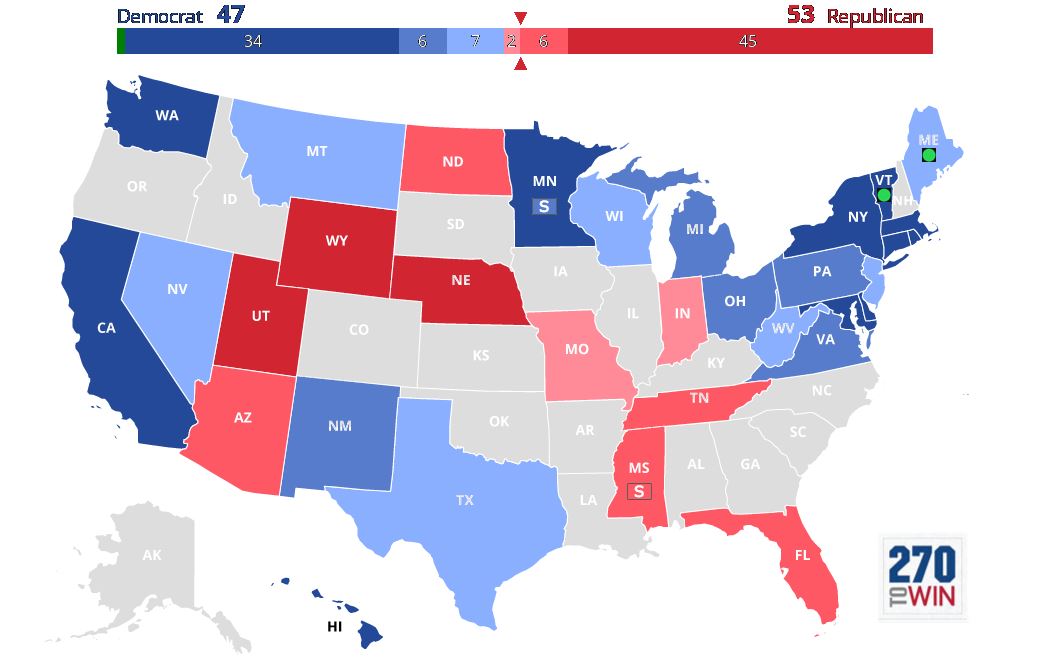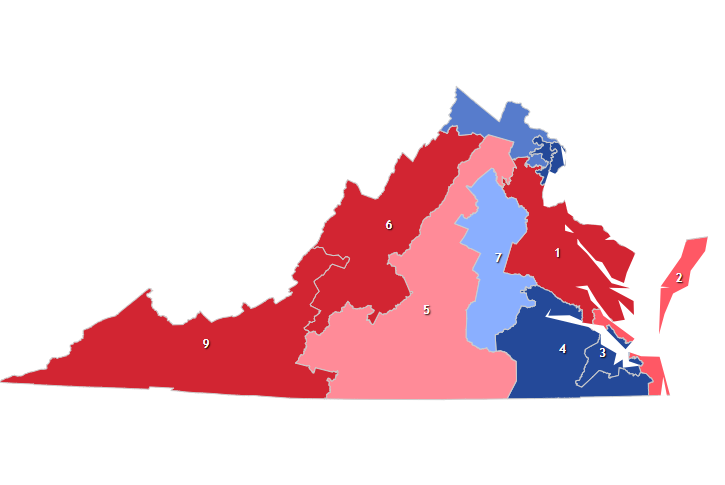Aynsleigh’s Predictions
November 6, 2018
Aynsleigh’s Predictions for U.S. Senate races:
Solid Democrat: Washington, California, Minnesota 1, New York, Hawaii, Massachusetts, Connecticut, Delaware, Maryland, Rhode Island
Likely Democrat: New Mexico, Michigan, Ohio, Virginia, Pennsylvania, Minnesota 2
Leaning Democrat: Texas, Montana, Wisconsin, West Virginia, New Jersey, Nevada
Independent: Maine, Vermont
Leaning Republican: Missouri, Indiana
Likely Republican: North Dakota, Arizona ,Tennessee, Florida, Mississippi 1, Mississippi 2
Solid Republican: Utah, Wyoming, Nebraska
Solid democratic states have very little chance of a republican winning; the running democrats have little to no chance of losing in November. These states are for instance, in California, both of the running senators are from the Democratic party, because of California’s jungle primary process where the top two vote getters in the primary, no matter the party, move on to the general election with Incumbent Dianne Feinstein leading as the favourite.
Minnesota is holding a special election on top of the regular senate elections because the previous senator resigned due to sexual assault allegations. For the statewide election, incumbent Democratic Senator Amy Klobuchar is running against District 15b State Representative Jim Newberger. Klobuchar is significantly ahead of Newberger in the polls, making this Minnesota race a Solid Democratic state. In the special election, Democratic Senator Tina Smith is far ahead of her opponent, Republican Karen Housley in the polls. Housley and Smith have disagreed on almost all large issues, and those who support Housley have been quite vocal about their stance and her numbers have grown, making the special election likely democratic.
Likely Democratic states such as New Mexico, Michigan, and Ohio are a bit more undetermined, however, there is a high chance of the Democratic Party taking the seats. In Ohio, incumbent Senator Sherrod Brown is considered too democratic for his state, but his active campaigning and skill at politics in general has given him a boost that will most likely result in him being elected. In New Mexico, Michigan, Pennsylvania, and Virginia all incumbent senators are Democrats with the opposition as Republicans.
In Virginia, Democratic Senator Tim Kaine is running against Republican Corey Stewart. Stewart is between a rock and a hard place; if he wins the position (which there is a slim chance of, according to polls) he becomes a senator. If he loses, his position as Chairman of the Prince Williams County Board of Supervisors will be challenged by Martin E. Nohe, a strong republican challenger. The main thing that makes Virginia a likely Democratic state and not a solid Democratic state is Stewart’s endorsement of Donald Trump; those who voted for Trump will most likely vote for Stewart because of this.
Leaning Democratic states are those that are near a toss up but have a higher chance of a Democratic senator being voted into office. Texas is the most tense state that is leaning Democratic, with incumbent Senator Ted Cruz being challenged by Beto O’Rourke. O’Rourke has served as Texas’ 16th congressional district’s representative since 2013 and his heavily left leaning views have caused quite a stir. The Houston Chronicle, a news organisation that backed Cruz in 2012, has officially endorsed O’Rourke. Although Cruz has a lead in the Polls, the official endorsements from generally conservative sites as well as continued rallying and campaigning from O’Rourke is bound to have some impact on the election results.
The other leaning Democratic states face similar dilemmas, however, since Cruz is a very prominent political figure, that race has been the most publicized out of this category. Montana, New Jersey, Wisconsin, and West Virginia all have Democrats as incumbent senators while Nevada has Republican Dean Heller as incumbent. Although Heller has been endorsed by Trump, recent polls show his opponent, Democrat Jacky Rosen, at roughly equal in the polls, with whoever is in the lead fluctuating daily.
The only states that have an independent in the running are Maine and Vermont. Funnily enough, Maine and Vermont are also solid independent states; there is an extraordinarily slim chance of the opposing party winning. In Maine, Independent incumbent Senator Angus King is significantly farther up in the polls than his Republican opponent Eric Brakey. This is most likely because King has a long history with Maine; having served as senator for Maine since 2013 and was the seventy-second governor of Maine from 1995-2003. In Vermont, Independent incumbent Senator Bernie Sanders is leading significantly in the polls; his Republican Opponent Lawrence Zupan is falling far behind.
The only states that are leaning Republican are Missouri and Indiana. The incumbent Senator, Claire McCaskill, is slightly behind Missouri’s Attorney General, Republican Josh Hawley in the polls. Similarly, in Indiana, Republican Mike Braun has pulled ahead of Democratic incumbent Joe Donnelly. Some key reasons for the situations that apply to both states are a lack of involvement/ endorsements from Trump, the Senators are moderate for their designated party resulting in conflicting voter views, and a lack of explosive debates or arguments over prominent issues.
The likely Republican states are North Dakota, Arizona ,Tennessee, Florida, and Mississippi (including the special election). North Dakota and Florida both have Democratic Incumbent Senators. The switch is most likely a result of the common occurrence where states with harsh party divides vote contrary to the previous elected official’s party out of anger toward their policies. Arizona and Tennessee have Republican incumbents with the Democratic opposition falling behind significantly in the polls.
Mississippi is holding a special election since the previous Senator, Thad Cochran, retired due to health issues. Both the special election and regular election are turning out to be likely Republican. The regular election is between the Republican Incumbent Senator Roger Wicker and Democratic Attorney David Baria. Wicker is being faced by a solid opponent, however, the democratic party has been more focused on filling out the special election seat, therefore, Baria’s campaign has fallen behind. The special election in Mississippi is an open primary, and the candidates are Republican Cindy Hyde-Smith, Democrat Mike Espy, and Republican Chris McDaniel. The two republican candidates outweigh Espy, and even though Espy has reliably moderate Democratic views and a solid following, Mississippi’s Republican history shows that the Republicans will most likely win. This special election is nonpartisan, and if no candidate receives the majority vote, the runoff election will occur on November 27. Since nobody approached 50% in early polling, this runoff is likely.
Solid Republican states include Utah, Wyoming, and Nebraska. These states are the polar opposite of solid Democratic states; there is virtually no chance of a Democratic nominee winning.
Aynsleigh’s House Predictions:
Solidly Democratic: 3rd, 4th, 8th, 11th
Leaning Democratic: 7th 10th
Leaning Republican: 5th
Likely Republican: 2nd
Solidly Republican: 1st, 6th, 9th
The solidly Democratic districts in Virginia are the 3rd, 4th, 8th, and 11th. These are the districts where a Republican Candidate has no chance of winning. In the 8th district in 2016, Incumbent Don Beyer won with over 70% of the vote. Since not much has changed in this district, Beyer will certainly win in this election.
The only Leaning Democratic districts are the 10th and 7th. In the 7th, Republican Incumbent David Brat is running against Democratic Nominee Abigail Spanberger and Libertarian Joe Walton. Spanberger is a new face for the Democratic Party in the area, and her history with public and government service is pushing her forward, hopefully far enough to beat Brat. In the 10th, Republican Incumbent Barbara Comstock is running against Democratic Senator for the 33rd State Senate District Jennifer Wexton. Even though Comstock has won by around 10-15 percent in 2014 and 2016, Wexton is running for house in the same district she represents in the senate, giving her an advantage not possessed by Comstock’s previous opponents.
The leaning Republican district is the 5th. In this district’s last house election, republican Tom Garrett won against the Democratic nominee by roughly 15%. Now, entirely new candidates are running with the Republican Nominee being Denver Riggleman and the Democratic Nominee being Leslie Cockburn. The only determining factor here is the Republican Party’s recent history in this state and the fact that Trump won this district in 2016.
The likely Republican district is the 2nd. Incumbent Scott Taylor is running against Democratic Nominee Elaine Luria, who was in the Navy for 20 years before getting into politics. Luria has a clear name and is a worthy candidate, however, her Democratic opposition in this election who ran against Taylor in 2016 was recently charged with fraud, which damages the Democratic Party’s reputation in this area.
Solid Republican districts (like Solidly Democratic districts) are those where the opposing party has no chance of winning. These districts are the 1st, 6th, and 9th. The 1st district, where Stafford is located, has Incumbent Rob Wittman running against Democratic Nominee Vangie Williams. Wittman has won by roughly 30% in the past three elections when running against opponents similar to Williams, so the results with certainly be the same.




